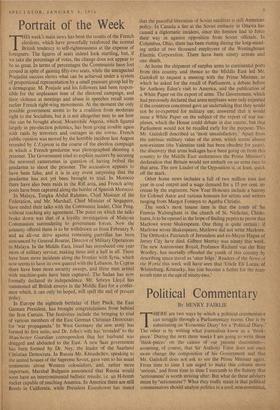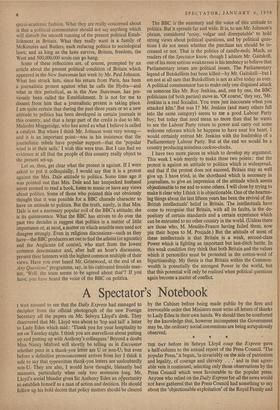Political Commentary
BY HENRY FAIRLIE THERE are two ways by which a political commentator can struggle through a Parliamentary recess. One is by substituting an 'Economic Diary' for a 'Political Diary.' The other is by writing what journalists know as a 'think- piece.' During the next three weeks 1 am going to write three 'think-pieces' on the causes of our present discontents— assuming, of course, that Sir Anthony Eden does- not once more change the composition of his Government and that Mr. Gaitskell does not ask to see the Prime Minister again. From time to time I am urged to make this column more 'serious,' and from time to time I succumb to the flattery that 'seriousness' is worth striving after. But what do these advisers mean by 'seriousness'? What they really mean is that political commentators should analyse politics in a cool, non-committal, quasi-academic fashion. What they are really concerned about is that a political commentator should not say anything which will disturb the smooth running of the present political Estab- lishment in Britain. What they really want is a family of McKenzies and Butlers, each reducing politics to sociological laws; and as long as the laws survive, Britain, freedom, the West and 500,000,000 souls can go hang.
Some of these reflections are, of course, prompted by an article about the present political condition of Britain which appeared in the New Statesman last week by Mr. Paul Johnson. What has struck him, since his return from Paris, has been a journalistic protest against what he calls the Hydra—and what in this periodical, as in the New Statesman, has pre- viously been called the Establishment. It is not for me to dissent from him that a journalistic protest is taking place. I am quite certain that during the past three years or so a new attitude to politics has been developed in certain journals in this country, and that a large part of the credit is due to Mr. Malcolm Muggeridge, who has acted as what I believe is called a catalyst. But where I think Mr. Johnson went very wrong— and it is an important point—was in his insistence that the journalistic rebels have popular support—that the 'popular wind is in their sails.' I wish this were true. But I can find no evidence at all that the people of this country really object to the present set-up.
Let us, then, get clear what the protest is against. If I were asked to put it colloquially, I would say that it is a protest against the Mrs. Dale attitude to politics. Some time ago it was pointed out that Mrs. Dale and her henpecked husband never seemed to read a book, listen to music or have any views about politics. Some of those who pointed this out obviously thought that it was possible for a BBC charade character to have an attitude to politics. But the truth, surely, is that Mrs. Dale is not a necessary popular evil of the BBC's attitude; she is its quintessence. What the BBC has striven to do over the past two decades is suggest that politics is a matter of little importance or, at most, a matter on which sensible men need not disagree strongly. Even in religious discussions—such as they have—the BBC producers set out to find the atheist (or agnostic) and the Anglicans (of course), who start from the lowest common denominator and, after half an hour's discussion, present their listeners with the highest common multiple of their views. Have you ever heard Mr. Grisewood, at the end of an Any Questions? programme, say, in his cultivated fireside man- ner. 'Well, the team seems to be agreed about that'? If you have, you have heard the voice of the BBC on politics. The BBC is 'the summary and the voice of this attitude to politics. But it spreads far and wide. It is, to use Mr. Johnson's phrase, considered 'noisy, vulgar and disreputable' to hold strong views about political questions, and by political ques- tions I do not mean whether the purchase tax should be in- creased or not. That is the politics of candle-ends. Much, as readers of the Spectator know, though I admire Mr. Gaitskell, one of his most serious weaknesses is his tendency to believe that Parliamentary issues are political issues. The Parliamentary legend of Butskellism has been killed—by Mr. Gaitskell—but I am not at all sure that Butskellism Is not as alive today as ever. A political commentator has to make only one disguised attack on someone like Mr. Roy Jenkins, and, one by one, the BBC politicians (of both parties) move in. 'Of course,' they say, `Mt Jenkins is a real Socialist. You were just inaccurate when you attacked hitn.' But was I? Mr. Jenkins (and many others fall into the same category) seems to me a good Labour Party boy; but today that need mean no more than that he wants to see the Labour 'Party return to power and carry out some welcome reforms which he happens to have near his heart. I would certainly entrust Mr. Jenkins with the leadership of a Parliamentary Labour Party. But at the end we would be a country producing noiseless cuckoo-clocks.
I have two more pieces in which to develop my argument. This week I wish merely to make these two points : that the protest is against an attitude to politics which is widespread, and that if the protest does not succeed, Britain may as well give up. I have tried, in the shorthand which is necessary in journalism, to give an impression of the attitude which seems objectionable to me and to some others. I will close by trying to make it clear why I think it is objectionable. One of the hearten- ing things about the last fifteen years has been the revival of the British intellectuals' belief in Britain. The intellectuals have come to recognise that Britain, with all its faults, is the de- pository of certain standards and a certain experience which can be entrusted to no other country in the world. (Unless there are those who. M. Mendes-France having failed them, now pin their hopes to M. Poujade.) But the attitude of most of these intellectuals is that Britain is a weak, second-class Power which is fighting an important but last-ditch battle. In this weak condition they think that both Britain and the values which it personifies must be protected in the cotton-wool of bipartisanship. My thesis is that Britain within the Common- wealth is potentially the strongest Power in the world, but that this potential will only be realised when political questions again become a matter of conflict.



































 Previous page
Previous page